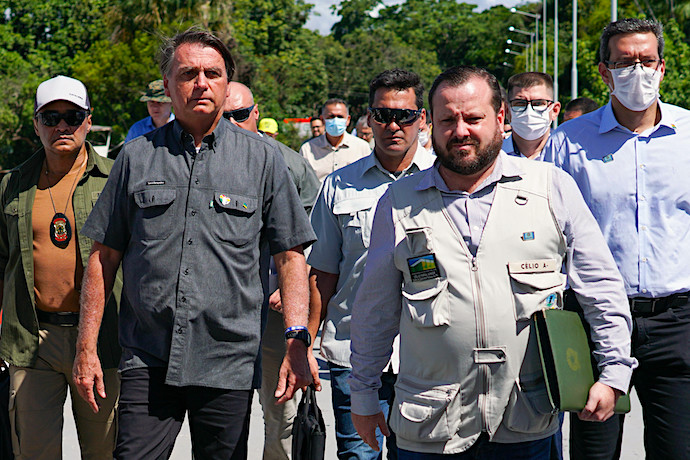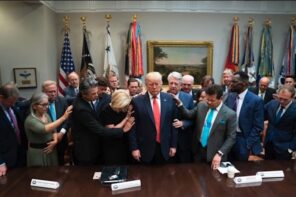UPDATE, October 31: This Sunday Lula won the Brazilian presidential election by an extremely narrow margin, though Brazil’s future remains in the balance. Bolsonaro and his allies engaged in systematic militarized voter suppression on the day of the election, hoping to stage a passive coup by preventing Lula’s base from getting to the polls. Even more worrying, the fact that 49% of Brazilian voters chose Bolsonaro’s sexist, racist, Christian nationalist policies should alarm observers the world over. As of Monday morning Bolsonaro has yet to concede the election and has remained completely silent on all social media, raising concerns that he might try to defy international calls to leave office and instead deny the election’s results á la Trump.
***
This weekend, October 30, the voters of Brazil will go back to the polls for the second time in less than a month in their runoff election. Since Brazil has many political parties there are a lot of runoffs after the first round eliminates many smaller candidates and members of less popular parties. But the most watched and most important of those races is for the presidency, whose original 11 candidates have been reduced to two.
The challenger is Luiz Inácio Lula da Silva (Lula), himself a former president who was a union organizer during Brazil’s military dictatorship and later became a politician with the Workers’ Party (PT, Partido de Trabalhadores). He was first elected President as part of the “Pink Tide,” a series of electoral victories that brought center-left politicians to power throughout Latin America, but he and his coalition were brought down by their involvement in the “Car Wash” scandal, the greatest corruption scandal in Brazil’s history and a contender for the biggest in any country in modern history.
The incumbent is Jair Messais Bolsonaro, a longtime politician and a popular firebrand. Known throughout his career for his racist, misogynist outbursts and his open support for violence against his opponents, Bolsonaro shocked Brazil with his victory against Lula’s surrogate candidate in 2018.
As President, Bolsonaro doubled down on his incendiary rhetoric and behavior, regularly making headlines with scandals ranging from overt racism against indigenous peoples to saying on a podcast that he had spontaneously ejaculated after seeing a group of underage Venezuelan sex workers. Bolsonaro’s supporters—disproportionately White in a country that is majority Black—love his challenging remarks and consider them the hallmark of a politician who isn’t interested in playing games but likes to “tell it like it is.”
And as Bolsonaro does all this he invokes God and his Christianity whenever possible, espousing his hateful speech directly from church pulpits while being blessed by conservative congregations.
This should sound very familiar to American readers. Bolsonaro’s behavior and the makeup of his supporters both consciously and unconsciously mirror Trump and the coalition of open racists and right-wingers that he developed in the US. But it goes further than that—Bolsonaro and Trump regularly amplify and support each other online, endorsing one another’s campaigns, and aping one another’s strategies.
Comparisons between the two men and their politics are a regular feature of English-language coverage of Bolsonaro, mostly describing him as a “Tropical Trump.” The fact is, Bolsonaro is in many ways a whole lot savvier than Trump—he’s been a politician for far longer, and historically has been better at reining in his coalition and keeping it on message. That message, in two words: Christian nationalism.
Christian nationalism is at the heart of both Trump’s and Bolsonaro’s politics, and this is nowhere more obvious than in each of their chief “ideologues.” Trump’s, former media mogul turned political strategist Steve Bannon, trucks with right-wing nationalist narratives like “the decline of western civilization” as a euphemism for the threat a multi-racial, pluralist democracy poses to White Christian nationalist supremacy.
This has led Bannon to talk about Trump and the victory of his Christian Right agenda as a form of preventive warfare, vital for defending civilization itself, which he and other Christian nationalists assume to be Christian. Their entire concept of civilization is, in fact, directly tied to their interpretation of Christian values.
The closest figure to Bannon for Bolsonaro was a man named Olavo de Carvalho, who died earlier this year—even more so than Bannon, de Carvalho promoted an explicit form of Christian nationalism that advocated against LGBTQ rights and other liberal democratic norms on the basis that society was experiencing a period of “decay or “decadence,” common dog whistles among Christian nationalists meant to convey that undesired groups like people of color, immigrants, and of course LGBTQ people present a threat to the nation’s well being .
De Carvalho was even more brazen than Bannon, arguing not just against the vaccine and climate change as scientific realities but against Einsteinian and Newtonian physics. He spread these ideas, as well as his skepticism of democracy, his racism, and his virulent opposition to abortion access, on popular web series and blogs as well as several books. Bolsonaro’s rhetoric and policies stem directly from the same font of right-wing Christianity that has plagued the US for decades.
This has meant that for the last four years Brazil has been governed by a chaotic version of its most conservative and right-wing sectors. Both Trump’s and Bolsonaro’s electoral bases are whiter than their countries as a whole. Both are disproportionately armed. And both are disproportionately members of conservative branches of Christianity.
Central to the nationalism of both Trump and Bolsonaro is the privileged playing the victim. Both do this in their political and personal lives, treating any accusations against them, not as criticisms or disagreements in a society based on the peaceful resolution of differences—but as personal and illegitimate attacks from some “deep state” bent on sinking their candidacy. More importantly, both Bolsonaro and Trump feed into a major tendency among their biggest supporters, right-wing and conservative Christians, to see themselves as the victims in a society in which they are in fact among the most privileged and protected.
In the US, the reasons are fairly straightforward as White Protestants, accustomed to representing the majority of the population and holding much of the power, watch their dominance wane. The Brazilian case is somewhat more complex. There, Protestants are a growing and fervent minority in a country that remains majority Catholic. Unlike in the US, these new evangelical and charismatic Protestants don’t have centuries of mainline Protestantism to contend with, which would seem to make their perspective that they’re being “victimized” or that they’re “targeted” for their faith more reasonable.
In fact, these evangelical Protestants have formed a religious and political coalition with the conservative and right-wing Catholics who were at the heart of popular support for Brazil’s 20th century military dictatorship, which, though moderate compared to neighboring Argentina, still murdered thousands of people, tortured more, and sent innumerable political dissidents to prison or exile—including Lula and his successor, Dilma Rousseff. This means that Protestant evangelicals in Brazil can both claim to be outsiders who need to reform the system while in reality fitting comfortably in the system of religiously organized anti-communist, anti-LGBTQ, and antiabortion politics that has held sway in Brazil for most of the last 60 years.
If you’re reading this in the US, pay close attention to what happens as it should offer a glimpse of what’s to come in the 2024 Presidential election. The GOP wants what Bolsonaro and his allies in Brazil already have: a country of people prepared for political violence, armed and loyal to their political leader, where abortion is a crime and the rights of minorities are something to laugh at rather than protect. Bolsonaro isn’t “Brazil’s Trump”—he’s a harbinger of the world that Christian nationalists are fighting for.





